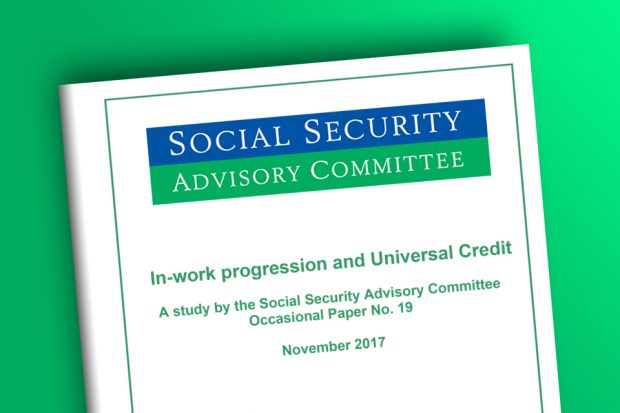
We’ve spent the last nine months looking at DWP’s programme for helping people in low paid work progress to better paid jobs or work extra hours. It’s not only very ambitious, it’s also contentious as it may mean asking people in work to take active steps to increase their earnings as a condition for getting Universal Credit. At the moment this programme is in an experimental phase as DWP test out how it might work.
Our report says it’s too early to draw firm conclusions on how it’s working, but that the government is right to be cautious. However, we conclude that the Department for Work and Pensions should:
- Test a much broader range of interventions, including those identified by work coaches in local Jobcentres, taking account of personal and local circumstances.
- Establish a clear evaluation framework to enable local testing, while drawing on the central analytical capacity to ensure rigorous evaluation.
- Avoid constraining work coaches with tightly-prescribed targets. However, policy and guidance needs to clarify the variety of reasons people have for working part time (e.g. having young children, having a disability or long-term condition, early phase self-employment, studying or re-training) if work coaches are to use discretion appropriately.
- Develop a richer understanding of working claimants and employers in key sectors. It is particularly important for DWP to understand routes into low paid work and the diverse circumstances of low paid households before any large scale migration of Tax Credit recipients onto Universal Credit.
- Take a data-driven approach to segmenting people’s circumstances, drawing on skills, work experience and attitudinal data.
- Fix the delays and complexity reported by Universal Credit claimants which may hinder in-work progression. The rules for couples are particularly complicated. Universal Credit needs to provide predictable support if it is to really help people increase their earnings.
- A better ‘it pays to progress’ calculator is needed for both recipients and work coaches to have greater confidence.
Listening to our stakeholders last week confirmed to me that the Committee was right to have looked at this entirely new departure for social security at this early stage. Although unemployment is now very low, long lasting low pay for those in work, accompanied by low productivity, is a major challenge for the UK. Therefore DWP’s in-work service may become a fundamental feature of the benefit system. Amongst the constructive challenges and questions that people raised with me last week were that:
- Simply asking part time workers to work longer hours should not become the default position for work coaches; they were now taking on responsibility for helping people to develop their careers.
- There was potential for a partnership between employers, employees and work coaches but would work coaches have the time to put into a genuine coaching relationship?
- If DWP goes down the route of mandatory requirements on working claimants, they need to be very careful about developing the sanctions regime as a drop in income for low paid people could easily put their jobs at risk.
We look forward to receiving the Government’s response to our report in due course, but in the meantime were pleased to note that - in his Budget Statement earlier this week - the Chancellor of the Exchequer announced that £8 million would be made available over the next four years to trial “innovative approaches to help individuals on Universal Credit earn more”.
1 comment
Comment by Trevor Wood posted on
I think it will be totally chaotic and unworkable. People who are working 40 or 50 hours a week, plus possibly spending 15 or more hours commuting to and from work, will not have time to do jobsearch or attend appointments at the Jobcentre. If I end up in this position I would simply not bother to claim any Working Tax Credits if that's what it's going to entail as it's more bother than it's worth. I will either work OR attend the Jobcentre, but I won't do both! If I'm in work I don't want to have anything whatsoever to do with the DWP/JCP. The main point of getting a job in the first place is to get the Jobcentre off your back.